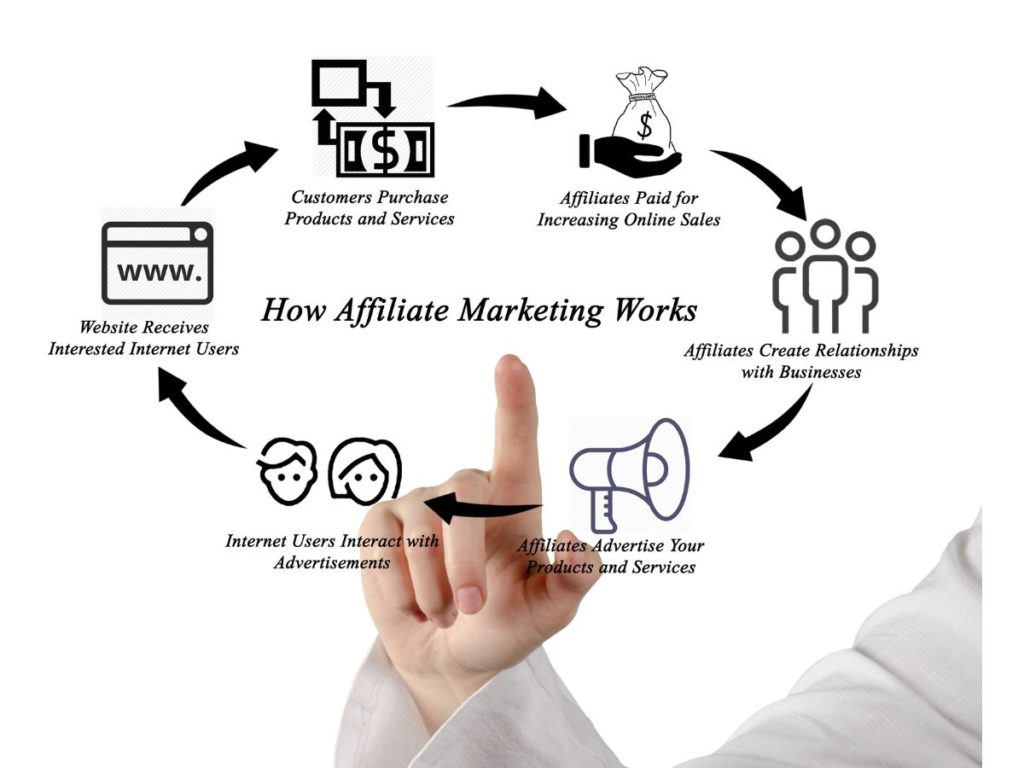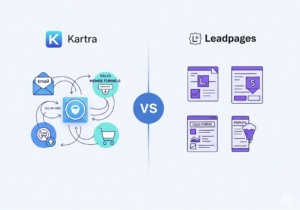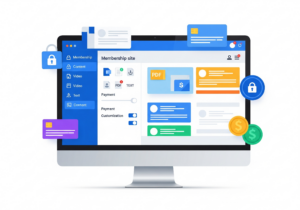Every activity in life has an opportunity cost attached to it. The same goes for affiliate marketing. The costs, however, are interestingly justified in terms of profits.
Statista estimated that total affiliate marketing spending in the US alone would reach a whopping $8.2 billion by end of 2022. As a multibillion-dollar industry, we see an increasing number of bloggers, influencers, and others jump on the affiliate marketing bandwagon.
Now, despite being a viable income option, affiliate marketing may only work for some. So, what does it take to make it big as an affiliate marketer, and how can one get started? All this and more are covered in this guide. So, keep reading.
Affiliate Disclaimer: I earn commission (get paid) if you click on the links and purchase a product below. My earnings do not impact the price you pay.
What is Affiliate Marketing?
Affiliate marketing is an online marketing method in which you earn money by promoting a brand’s products or services. It can also be called the method of converting product recommendations into a source of income.
This works as follows: you become an affiliate, and every time a customer purchases a product or service based on your recommendations, you earn a percentage of the profit. It is somewhat similar to a salesperson’s job; however, the critical difference is that you do not work for the company.
How Does Affiliate Marketing Work?

The process of affiliate marketing is simple. For instance – it all starts with choosing a relevant affiliate program or network. This depends on factors such as the types of products available for promotion, payment methods, commissions, etc.
Then, you sign up for the program most appeals to you. The next step is creating relevant content and adding custom affiliate links that direct users to the product page. The links are trackable, so you will know when a user purchases them.
After the purchase, you earn a commission – usually a percentage of the advertiser’s revenue. The commission rate varies among affiliate programs, with some being more lucrative than others. Affiliate marketing usually involves three individuals –
1. The Merchant
The merchant is also known as the seller, the creator, the brand, or the vendor. This party is involved in manufacturing or producing the product or service.
The brand can be a small company. Individuals who manufacture specific products can also be classified as merchants. Active involvement is not crucial; what is vital is having a self-made product to sell.
2. The Affiliate (Marketer)
This party is also known as the publisher and is deeply involved in the marketing process of the product. They usually have a blog with a strong following and publish valuable content for their audience.
They may promote the merchant’s products subtly through educational content. The promotion happens through affiliate links that the audience can click.
3. The Consumer
The consumer is the third and final entity involved in affiliate marketing. This entity is the most important because, without consumption and sales, there can be no revenue or commission.
The affiliate marketer markets a product or service through any channel they may see fit. These include social media platforms, paid search, digital billboards, or content marketing through blogging.
In affiliate marketing, the affiliate must post a disclaimer telling the customer that if they purchase any item through the links placed on the website, the affiliate will receive a small commission.
Types of Affiliate Marketing
All affiliate marketing is not the same. This marketing strategy is divided into three categories, listed as follows –
1. Unattached Affiliate Marketing
As the name suggests, this affiliate marketing strategy is one in which the affiliate has no direct connection to or involvement in manufacturing the product or service they are promoting. The affiliate possesses no relevant expertise or skills needed to produce the product.
As such, they can make no claims about how the product will be used, precautions (if any), proper maintenance and care, etc. The unattached style of affiliate marketing is the strategy in which the affiliate’s role in the manufacture or production of the products is uninvolved.
They will merely promote the product or service without revealing any additional information as to the correct use of the product.
2. Related Affiliate Marketing
This is the next type of affiliate marketing, where there is some degree of connection between the affiliate and the offering. Usually, in the case of related affiliate marketing, the affiliate’s niche is connected to the product or service they’re promoting.
The affiliate may even be an online influencer with a decent following. This makes them capable of generating traffic and driving good sales. The affiliate may have used the product and is deeply aware of its pros, cons, usage, etc.
Their audience views them as a trusted source on the offering. However, even in related affiliate marketing, the affiliate makes no claims on the precautions or usage of the product.
3. Involved Affiliate Marketing
The third and final category of affiliate marketing is the most connected kind, wherein the affiliate uses the product they’re promoting or regularly doing. As a result, they decide to share their positive experiences with their audience.
In the case of involved affiliate marketing, the affiliate’s reviews are the advertisements needed to generate traffic and drive sales. While this type of affiliate marketing has its benefits, there is a flip side to it as well.
Any grievances that may arise in association with the product or service threaten to compromise the affiliate’s reputation and market credibility.
How to Start an Affiliate Marketing Program

Affiliate marketing programs are popular, benefitting all three parties involved – customers, affiliates, and merchants. But how does one become an affiliate marketer? Listed below are the steps –
1. Choose a Platform
The first step to becoming a successful affiliate marketer is choosing lucrative promotional platforms. The thing about affiliate marketing is that the best platform will depend upon your unique needs. Keep a few factors in mind while choosing a good affiliate marketing program –
- Products
The first factor to consider is the types of products or services you wish to promote as an affiliate marketer. You can take cues from your niche, your blog’s content, etc.
For example,
If your blog is focused on personal development, you might consider promoting audio books and hardcover books on the subject.
If your blog is focused on DIY and woodworking, you might consider promoting woodworking tools.
If your blog is focused on parenting, you might consider promoting toys and electronics for kids. You may also take your audience as the cue, choosing to promote products or services they might be interested in
- Commission Rates
Another factor to consider is whether an affiliate marketing program is good for you to observe the commission rates they are willing to offer. Some programs do not provide lucrative commissions.
Be wary of such programs. Instead, you should opt for affiliate marketing programs that promise good incentives and commission rates that maximize your revenue.
- Cookie Life
The cookie duration or life refers to the period for which an affiliate product may be purchased through your affiliate link. The cookie life is the duration you can receive a commission when a viewer clicks the link or makes a purchase.
Beyond this duration, all sales made through your affiliate links will earn you no commission. So, take cookie duration also as an essential factor. Opt for affiliate marketing programs that offer a longer cookie life.
- Terms of Enrolment
Affiliate marketing platforms may have specific requirements which the affiliate marketer needs to meet. After meeting these requirements, the affiliate’s order is approved.
An example of such a term of enrolment would be minimum website traffic, domain authority, and a minimum number of followers across social media platforms, etc. These are reasonable; however, they may be a hassle, especially for beginners.
Regardless, you can opt for affiliate marketing programs that do not come with such hassles. Finally, consider the abovementioned factors before choosing an affiliate marketing program to work with.
2. Decide Your Niche and Audience
Once you have chosen a lucrative affiliate marketing program, the next step is to select your viewer base and niche. Even when it comes to choosing the niche, consider some important factors –
- Your Interests and Hobbies
Though there are many ways to discover your niche, one logical way to begin is with your hobbies and interests. This also makes for the safest option because since you already spend money on such products, you can engage with your audience based on personal experiences.
Just keep in mind whether these options are available as an online business. Countless people have successfully built online businesses (even affiliate marketing) by converting their hobbies into business niches.
Take the example of the website – SavvyGardening. It was started and is owned by a close group of friends who are also passionate gardeners. The team periodically publishes content on gardening and, in the process, recommends its audience different tools and gardening products. They use Google Adsense to generate money through affiliate links.
- Assess Your Competition and the Search Volume for the niche
After shortlisting a few niches based on your interests and hobbies, evaluate whether the competition in that field is high or low.
It is best to avoid niches with little competition because the profit margin in such cases is also low. Choose niches with medium to high competition. Also, do not confuse keyword research with niche analysis.
While researching for popular keywords in your niche, choose those with low to medium because that increases your chances of ranking high. With keyword analysis, the main aim is to understand whether the niche can earn you a good commission.
- Keep an eye out for Market Deficiencies
To be a successful affiliate marketer in your niche, you must regularly provide valuable content for your audience. However, your competitors are also trying to do the same.
Keeping that in mind, assess your competition carefully. Go through their website, read their content, and see how they rank in the market. Run a solid content gap analysis to determine where your competitors are falling short, and take advantage.
For example, you might discover that your competitors only post long-form blogs with text and no images. You can find your opportunity in this area by including content-relevant images, videos, GIFs, etc., to make it more interesting and readable.
- Define Your Unique Selling Point (USP)
This is the final step. Once the niche is chosen, you still need to understand your original angle. Additionally, you also need to decide what sets you apart from your competitors, how people will remember you, etc.
This issue is especially pertinent in niches with severe competition. The best way would be to create a unique and interesting story that your audience finds relatable. You can also create an eye-catching or authoritative website in your domain.
3.Find Affiliate Programs to Join
The next step is to find some solid affiliate programs in your niche. The market is full of high-paying affiliate programs to join. You can find some good ones simply by running a Google search for, “affiliate marketing + the niche of your choice.”
Besides searching on Google, other ways to find reliable affiliate marketing programs include affiliate directories. These directories have listings of your affiliate programs. Managers of affiliate programs come to these directories to gain visibility.
Not only that, but you can also look for relevant affiliate products to promote in your existing product’s competing niche. Have you written an in-depth review of a product or service? If yes, find related products and search for affiliate programs for these products. You can develop comparison articles that offer great value to your audience while subtly directing them to the recommended product or service through an affiliate link.
4. Promote Your Offers
The final step is to promote these affiliate links in the right way. So, what are some ways in which you can successfully promote products and services through affiliate links?
- Product Reviews and Tutorials
Product reviews mainly target people with purchase intent, whereas tutorials are more crucial to driving traffic and building authority in your niche. However, you might need both to build your brand.
The key is to ensure not all content is profit-oriented. Most should create immense value for the readers by teaching them something new. In product reviews and tutorials, you get the opportunity to cover everything about a product and then offer viewers to try it for themselves (through an affiliate link).
- Affiliate Website Banners
Contextual links are always ahead of banners when generating and driving traffic. However, banners are more visually appealing and catch the eye sooner.
Plus, they can be easily placed on the page’s header, footer, sidebar, or even within the content. Since the affiliate link is automatically embedded into the code, you must copy-paste the same to your page.
Remember the thumb rule – the higher a banner is placed on your page, the more views it will attract and, thereby, clicks.
- Affiliate Links in Emails and Newsletters
Your viewership is already good enough if you have an email list of blog subscribers. An excellent place to start affiliate marketing would be to create an email sign-up form.
You can build a strong relationship with your audience through the newsletter, promote affiliate products and services, distribute blog content, etc.
To get viewers to subscribe to your newsletters, share highly useful content and exclusive eBooks or guides otherwise not available to generic website visitors. You can even offer subscribers special deals through affiliate links.
Common Affiliate Marketing Channels
Marketers consider affiliate marketing a cost-effective and efficient method of earning income. Let’s explore the most common or popular affiliate marketing channels.
1. Influencer Marketing
Influencer affiliate marketing is a strategy by which brands or advertisers use influencers to generate traffic or sales. This is a highly strategic move because influencer affiliate marketing has two-fold benefits – the affiliate program drives higher sales, whereas the influencer program helps increase brand awareness.
The right affiliate program will help you combine the two strategies. You will be able to place affiliate links within the influencer content to track conversions. Simultaneously, you can also use influencer marketing campaigns to report long-term goals and create a deeper connection with your target audience.
Regarding influencer marketing, you must choose the right strategy and influencer based on your bandwidth and goals. These, combined with the right affiliate marketing programs, will ensure you succeed.
2. Blogging
If there is one vital cog keeping the wheel of affiliate marketing running, it is that of blogging. Nearly 65% of all affiliates rely on blogging as a reliable means to promote products and services and drive traffic to the merchant’s website.
The way a blog affiliate works is that it offers the viewers or audience valuable content that is related to the affiliate’s niche. The affiliate is generally an expert in their field, and they curate content related to that field, showcasing products in the process.
For instance – in the case of beauty, bloggers may share suggestions with makeup and tutorials. In the process, they may share or recommend the makeup or skincare products they used in the tutorial so that the audience can directly explore and purchase through the affiliate links.
Just like this, bloggers’ niches may extend to other areas such as travel, personal finance, cooking, lifestyle, and much more. An important thing to mention here is that bloggers are usually SEO experts. This ensures that the content reaches a wide group of audience.
Besides affiliate links, advertisers or brands also aggressively help bloggers with referral codes. Regarding blog affiliate marketing’s performance, long-form content performs better than its short-form counterpart.
3. Social Media Marketing
Social media influencer trend is on the rise. Influencers can easily have tens of thousands to millions of followers who diligently track their every move through posts, stories, videos, etc. These followers and viewers are interested in the influencer’s niche and look up to them for valuable advice and tips.
The secret behind the success of social media affiliate marketing is the strong bond that the influencers share with their followers or subscribers. The content they create is valuable, relatable, and genuine for the followers.
Hence, this builds a high degree of trust. If the influencer promotes or recommends a particular product or service, followers quickly engage, interact, and even purchase the recommended products or services.
This is mainly why many advertisers and brands take hold of social media influencers and offer them special coupon codes. When customers purchase through these coupon codes, they receive lucrative discounts and the influencer, in turn, becomes eligible for a commission.
Besides sales, affiliate social media marketing also helps increase brand conversion rates. Not only that but also each brand that the influencer works with helps track their performance, thereby benefitting the brand with extra sales.
4. Paid Search Marketing
Many a time, brands find direct paid search advertising to be highly challenging and competitive. You can use your affiliates to win the market in such a case.
Keep in mind that this is a highly competitive search field. Even here, commission or income depends upon website visitors, impressions, clicks, and leads. So, choose a relevant niche and gather a decent following so your audience will click and purchase through your affiliate links.
Paid search affiliate marketing can be divided into three categories –
- Pay Per Impression Affiliate
In this case, the affiliate receives revenue or commission based on the number of impressions the ad gets as visitors view it.
This model is more common in niche websites with a highly targeted audience.
- Pay Per Lead Affiliate
In this case, the affiliate receives money when website visitors successfully fill out a form the advertiser may need.
The form is then sold to other companies as the data is used to improve customer experience, etc. This form of paid search affiliate marketing is the most common in the financial services sector.
- Pay Per Action Affiliate
This type of paid search affiliate marketing earns the affiliate revenue when the website visitor takes a set of particular actions defined by the affiliate marketing program.
The actions are usually live on the network ads.
Why Be an Affiliate Marketer?
What are the benefits of affiliate marketing, and why are so many people opting to become one? Listed below are four reasons you should also consider becoming an affiliate marketer –
1. Passive Income
When done effectively, affiliate marketing allows you to create a steady stream of passive income. Just picture this scenario to relate better – you’re out to enjoy a relaxing trip to the Caribbean islands for two weeks.
Without a care in the world, you’re soaking in the beauty of luxurious beaches and scenic locations. Then, soon enough, it’s time to return home. Usually, by this time (the two-week period), your bank account would have taken a turn for the worse.
However, that will not be the case if you already earn passive income through affiliate marketing. Your financial situation would be stable or could even improve with affiliate marketing.
2. No Customer Support
Another important benefit of affiliate marketing is that no customer support is needed to promote products and services online. Perhaps you want the freedom to commence your own business but do not wish to deal with customers on a personal level; then this marketing is your ideal job.
However, keep in mind to promote only high-quality products and services that you’re confident your audience would invest in. Inferior products may damage your reputation and make you lose credibility in the market.
3. Work from Home
A third reason to become an affiliate marketer is that you need not go to an office to work. Affiliate marketing can be easily carried out from the comfort of your home. This flexibility enables you to follow your passions and interests while also setting up a steady flow of income.
All you need to do is promote, recommend, and sell the product without the hassle of designing, manufacturing, or creating it. Just choose the right products, and you should make a decent income.
4. Convenient and Flexible
The affiliate link you wish to promote can be run through various campaigns across different websites. You can compare and then focus only on the links that perform well.
Plus, you are not limited to a single product, so running multiple affiliate programs across various product categories is possible. Finding one product difficult to sell? Move on to the next one!
This way, chances of growth also increase.
What are Affiliate Marketing Programs?
Every affiliate marketer works with the help of affiliate marketing programs, which are in-house systems used to manage and run an affiliate marketing strategy. The foundation for such a program is usually established as an agreement between the affiliate and the merchant.
Meaning, before an affiliate marketing program, is run, the details of the working relationship between the affiliate and the merchant are decided and approved. This includes details regarding the affiliate’s promotions, how commissions are to be paid, what qualifies for commissions, how the products are to be promoted and distributed, etc.
These specifics will vary, depending upon the number of new customers the affiliate can bring. If the affiliate merchant notices that the affiliate is able to drive higher sales by building a larger audience, they may agree to offer a higher commission.
Affiliate Marketing Program Examples
Top companies, even those belonging to the Big Four, use affiliate marketing as a tried and trusted marketing strategy. As discussed below, let’s look at four of the most successful examples.
1. Amazon Affiliate Marketing
How can one talk about successful affiliate marketing programs and not mention the superpower, Amazon? The company’s affiliate marketing program, called Amazon Associates, is the world’s largest to date.
All kinds of influencers, from publishers to bloggers and creators, sign up for the company’s affiliate marketing program. They publish product recommendations on their websites, blogs, etc., and Amazon pays them compensation based on their sites’ traffic and sales.
However, Amazon is pretty strict when it comes to the kinds of ads that it allows. For instance – The website on which the products are to be promoted must meet Amazon’s quality checks, and the content should be fresh, original, and new.
Any content the company deems offensive, harmful to the audience or violent disqualifies the website from participating in the affiliate marketing program. Also, no replicate content is allowed.
The Amazon staff conducts a thorough review to check whether the affiliate’s website meets quality standards. Other than that, they also need to meet a qualified sales quota – the number is three and the duration is 180 days from the date of application.
If the website passes Amazon’s requirements and quality checks, the affiliate or associate (in the case of the company), earns 20% as a commission for all qualified sales. This rate is fixed and is dependent on the product categories and programs. Besides this standardized rate, Amazon also offers special commissions for specific events.
2. eBay Affiliate Marketing
Another retail giant at par with Amazon, eBay, also offers a solid affiliate marketing program named eBay Partner Network. Without shipping or selling, affiliates can promote the brand’s offerings on their blogs and websites.
The company offers a commission of 4% of every sale made through the affiliate link. This commission is received only if the buyer completes what is known as a ‘Qualifying Transaction.’ eBay offers not only a commission but also an incentive credit that offsets the final value fee of a particular transaction.
The Qualifying Transaction includes –
- The buyer purchases within 24 hours of clicking through the affiliate link.
- A buyer starts an auction through the affiliate link within 24 hours of clicking it. They also win the auction within 10 days of creating it.
- The seller is willing to accept a buyer’s Best Offer within 24 hours of them clicking through the affiliate link.
eBay’s affiliate marketing program is also lucrative and fairly easy to sign up for and manage.
3.TripAdvisor
The TripAdvisor affiliate program called Travelpayouts mainly targets bloggers specializing in the travelling niche. With a solid 14-day cookie life, the program generates its affiliates with 8% in commission for every completed booking (except for virtual/online experiences).
Additionally, the affiliate is also eligible for 50% of the advertiser’s revenue when the visitor makes an eligible click-out from a search result. Affiliates can target audiences worldwide with TripAdvisor’s affiliate marketing program.
The allowed traffic type includes content project and YouTube traffic. However, the company strictly excludes traffic from cashback, native advertising, toolbar, coupon codes, display ads, etc., as a part of the affiliate marketing program’s acceptable traffic.
The top kinds of products featured on TripAdvisor’s affiliate marketing program include car rentals, things to do, holiday homes, restaurants, flights, and more. While anyone interested in the travel industry and blogging are welcome to join the affiliate program, there are some restrictions.
Websites that are direct competitors of TripAdvisor are not allowed to join. Similarly, those joining from meta-search engines such as Kayak or Trivago and hotel and rental aggregator sites cannot become a part of the affiliate marketing program.
The company pays its affiliates their commission only 30 days after the booking is confirmed. This is done because there are chances of sudden cancellations on the customer’s part. Given TripAdvisor’s strong network, the company allows its affiliates to connect with nearly 500,000 cities worldwide.
4.Target
Target’s affiliate marketing program called Target Partners is another lucrative program that allows its affiliates to earn a commission through their best Target finds. The principle of this affiliate program is somewhat similar to that of Amazon Associates.
All affiliates can earn a commission of up to 8% of the advertiser revenue. Affiliates also benefit from the scope of content creation with Target’s affiliate marketing program is as high as that with Amazon Associates.
You can develop a blog on grocery items, furniture, clothing and accessories, toys, electronics, household essentials, and more. Finding relevant Target affiliate links and inserting them is fairly easy.
The program also has a pay-per-click setup wherein the affiliate earns a commission for every 100 clicks of the affiliate link. Target’s affiliate program is also worth a second look as it is as stable as Amazon Associates, offers good conversion rates, and has a cookie policy of seven days.
To Wrap Things Up
Affiliate marketing is undoubtedly challenging, especially if you’re a beginner. However, it’s an awesome opportunity to increase income as traffic increases. One timeless tip would be never to lose sight of authenticity.
This is because authenticity is hard to fake, and it has the power to build you from the ground up. Incessant product promotion shows little regard for customers or viewers. However, a promotion that stems from a genuine passion for the product’s benefits does wonder for promotional activities.
Never make the mistake of some affiliates who treat their audience as projects and products as a source of revenue. Always treat your audience like humans and only promote products you’re truly passionate about (or at least hold some interest in), and you will succeed sooner than you think.
Recent Post

Kartra and Leadpages both help you grow your business online fast. But they serve different purposes, so the choice really depends on you. Kartra is

A membership site gives content only to people who sign up first. It’s great for courses, training, digital products, or private communities. You control who

Kartra is an all-in-one platform made for online businesses. It helps you build, launch, and grow your business from one place. You don’t need ten



